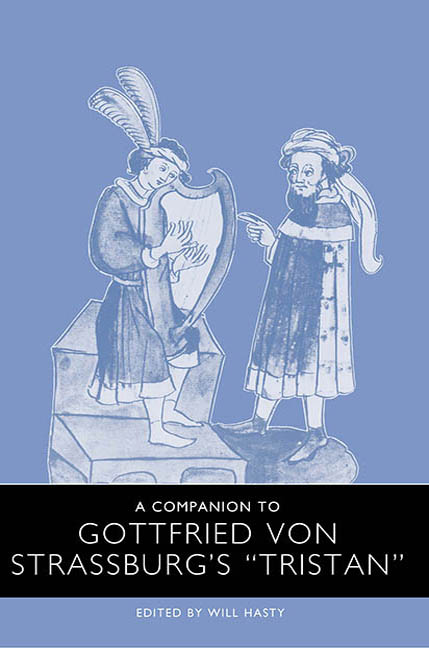Book contents
- Frontmatter
- Contents
- Acknowledgments
- Introduction: The Challenge of Gottfried's Tristan
- I Cultural and Social Contexts
- II Figures, Themes, Episodes
- III Gottfried's Narrative Art
- IV The Medieval and Modern Reception of Gottfried's Tristan
- The Medieval Reception of Gottfried's Tristan
- The Modern Reception of Gottfried's Tristan and the Medieval Legend of Tristan and Isolde
- Notes on the Contributors
- Index
The Medieval Reception of Gottfried's Tristan
from IV - The Medieval and Modern Reception of Gottfried's Tristan
Published online by Cambridge University Press: 28 April 2017
- Frontmatter
- Contents
- Acknowledgments
- Introduction: The Challenge of Gottfried's Tristan
- I Cultural and Social Contexts
- II Figures, Themes, Episodes
- III Gottfried's Narrative Art
- IV The Medieval and Modern Reception of Gottfried's Tristan
- The Medieval Reception of Gottfried's Tristan
- The Modern Reception of Gottfried's Tristan and the Medieval Legend of Tristan and Isolde
- Notes on the Contributors
- Index
Summary
One would like to be able to commence a study of the medieval reception of Gottfried's Tristan with a clear view of the response to it of Gottfried's closest and most significant contemporary, but the evidence of a sustained exchange, still less a “feud” between Gottfried and Wolfram von Eschenbach is simply not available, or at best based on supposition, despite the assumption by generations of scholars that it existed. There is too little firm information about the relative chronology of the passages in question, and one is left with little more than the belief that Gottfried must have disliked the convoluted style of Wolfram's narrative and that Wolfram cannot possibly have approved of the adulterous love affair, which went counter to his firmly held views on the value of marriage and the need to live within a social framework. Wolf-ram may be the hasen geselle (friend of the hare; 4638) of Gottfried's literary excursus (but see Ganz 1966, 73–76 for some powerful arguments against this view) and when Gottfried condemns “the tellers of wild tales” who need to attach commentaries to their work (4683–90), he may have Wolfram not least in his mind. It is tempting to view Wolf-ram's contemptuous words in Parzival (1, 15–17) about those who cannot understand his words as his rebuttal. His refusal to use the name Blanscheflur for the wife of his Parzival may be a sign of his disapproval of Gottfried's heroine of that name, the beloved of Riwalin, but it could equally be his way of divorcing himself from her predecessor in Chrétien's work, or — no less likely — his seizing the opportunity to create a new and meaningful name, Condwiramurs, for his newly conceived character. Such matters do not constitute a feud, such as was assumed by generations of Germanists and argued in detail by, among others, Karl K. Klein (1953, 1961) and W. J. Schröder (1958), though one may not go so far as Ganz in ruling out the possibility of antagonism between the two great poets.
- Type
- Chapter
- Information
- A Companion to Gottfried von Strassburg's Tristan , pp. 261 - 284Publisher: Boydell & BrewerPrint publication year: 2003



